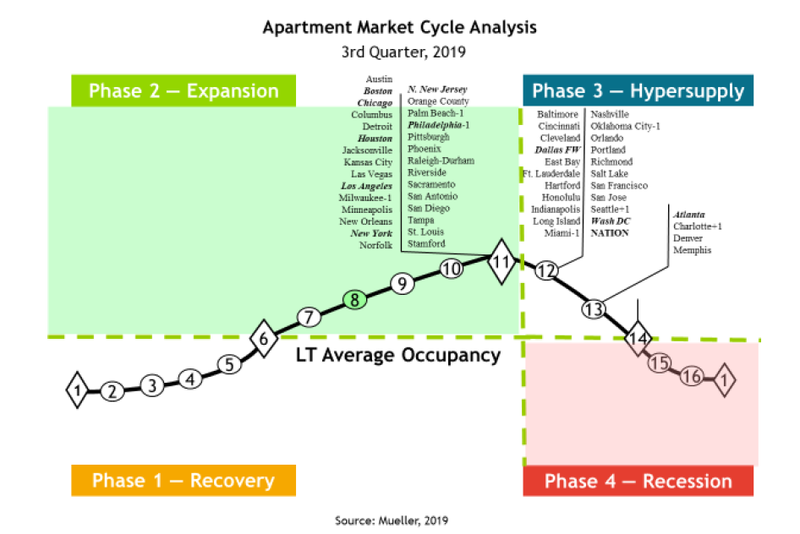Multi-Family and Apartment Investing
Market News & Data
General Info
Real Estate Strategies

Landlording & Rental Properties
Real Estate Professionals
Financial, Tax, & Legal


Real Estate Classifieds
Reviews & Feedback
Updated about 5 years ago on . Most recent reply
Apartment Market Cycles and Best Cities to Buy
Hi BP Nation,
I found the latest market cycle report. See below:

The "y axis" is occupancy. As it crosses the LT (Long Term) Average Occupancy, it's a good enough market to build new apartment buildings. Dr. Mueller (the researcher who developed this) divided the market cycles into 4 Main Phases/Cycles/Quadrants with 16 distinct points.
Best time to buy/ build are points 8 to 11 (Expansion) as rents & occupancy are increasing the fastest.
Points 12-13 are still good points to buy in because rents are still increasing but at a lower rate and occupancy is moving down to the long term average.
A city can actually move backward (not just forward) through the 4 Market Phases. So it can be in Hypersupply today but it does not mean it will go down to Recession stage. It can actually go back to Expansion stage.
So questions to experienced apartment syndicators/sponsors:
1. Do you use Dr Mueller's report in determining where to buy and when to buy?
2. I didn't find use for Dr Mueller's Market Cycle Report before BUT since now I can buy apartments nationwide, I am interested to know which cities I should focus on. Two cities keep on appearing in all the research my staff has done: Austin and Phoenix. What do you think of these 2 cities?
3. What other Market studies do you look at to evaluate/determine which cities/sub-market to buy in?
Calling on Ben Leybovich, Brian Burke, @Chris Salerno, @Grant Cardone, @Alina Trigub, @Ola Dantis, @John Casmon...
Since the graphic above is not very clear, below are the cities that are still in Expansion Phase:
Austin
Boston
Chicago
Columbus
Detroit
Houston
Jacksonville
Kansas City
Las Vegas
Los Angeles
Milwaukee
Minneapolis
New Orleans
New York
Norfolk
N. New Jersey
Orange County
Palm Beach
Philadelphia
Pittsburgh
Phoenix
Raleigh-Durham
Riverside
Sacramento
San Antonio
San Diego
Tampa
St Louis
Stamford
Most Popular Reply
Originally posted by @Michael Ealy:
Hi BP Nation,
I found the latest market cycle report. See below:

The "y axis" is occupancy. As it crosses the LT (Long Term) Average Occupancy, it's a good enough market to build new apartment buildings. Dr. Mueller (the researcher who developed this) divided the market cycles into 4 Main Phases/Cycles/Quadrants with 16 distinct points.
Best time to buy/ build are points 8 to 11 (Expansion) as rents & occupancy are increasing the fastest.
Points 12-13 are still good points to buy in because rents are still increasing but at a lower rate and occupancy is moving down to the long term average.
A city can actually move backward (not just forward) through the 4 Market Phases. So it can be in Hypersupply today but it does not mean it will go down to Recession stage. It can actually go back to Expansion stage.
So questions to experienced apartment syndicators/sponsors:
1. Do you use Dr Mueller's report in determining where to buy and when to buy?
2. I didn't find use for Dr Mueller's Market Cycle Report before BUT since now I can buy apartments nationwide, I am interested to know which cities I should focus on. Two cities keep on appearing in all the research my staff has done: Austin and Phoenix. What do you think of these 2 cities?
3. What other Market studies do you look at to evaluate/determine which cities/sub-market to buy in?
Calling on Ben Leybovich, Brian Burke, @Chris Salerno, @Grant Cardone, @Alina Trigub, @Ola Dantis, @John Casmon...
Since the graphic above is not very clear, below are the cities that are still in Expansion Phase:
Austin
Boston
Chicago
Columbus
Detroit
Houston
Jacksonville
Kansas City
Las Vegas
Los Angeles
Milwaukee
Minneapolis
New Orleans
New York
Norfolk
N. New Jersey
Orange County
Palm Beach
Philadelphia
Pittsburgh
Phoenix
Raleigh-Durham
Riverside
Sacramento
San Antonio
San Diego
Tampa
St Louis
Stamford
I think the Carolina market is going to be very strong. I do not see the major markets in the Carolinas going into a recession based on the strong jobs that are going to those cities. A lot of people focus on the media and these types of graphs. I think if they focus on buying a great deal they will make money in any type of market.
